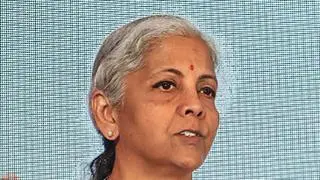The worst may be over for India’s economy but uncertainty still lies ahead, and qualitative fiscal reforms are necessary to ward off any further bad news, chief of global rating agency Fitch’s Indian arm has said.
“This is the bottom of the pit (for the Indian economy). Now whether we dig a further or deeper pit for ourselves by not implementing the fiscal reforms, or we find steps to climb up, that is where the uncertainty lies,” India Ratings Managing Director and CEO Atul Joshi told PTI.
“The worst is behind us, but there is uncertainty ahead of us, which if not handled properly would result in further bad news. If handled properly and executed well, then there is only good news ahead,” Joshi said in an interview here.
“This is the bottom and the worst is over as of now,” Joshi said, when asked whether the worst is over for the Indian economy.
Joshi, however, refused to comment on whether the risks still remain about a possible downgrade in India’s sovereign credit rating to ‘junk’ status, or the prospects have improved for an upgrade.
“It would be inappropriate for me to comment on where it (rating for India) will go, as there is a separate sovereign team at Fitch Group to look at that aspect,” he said.
India Ratings, which was formerly known as Fitch India, is a wholly owned subsidiary of global rating agency major Fitch Group.
India’s credit rating was put on a ‘negative’ outlook by various agencies including Fitch last year due to a slowdown in economic growth rate and lack of economic reforms.
A negative outlook means a potential downgrade from the current rating, which is the lowest investment grade rating ‘BBB—’ in case of India.
“Currently, Fitch has a BBB— rating for India with a negative outlook and the last what we said about it is that there is one in three chance of downgrade and that position remains as of now,” Joshi said.
Another rating agency Standard & Poor’s (S&P) has also put India on a negative outlook, but it recently said that the outlook could be revised to ‘positive’ if the government implements initiatives to reduce structural fiscal deficits, improves investment climate and increase growth prospects.
Besides, Moody’s said in its recent India outlook report that the worst may be over for the Indian economy and the GDP growth rate could bounce back to 7 per cent from 2014 onwards after bottoming out in the quarter ended December 31, 2012.
Asked about steps needed to be taken by the government, Joshi said: “What we need is qualitative fiscal reforms.
Fiscal reforms by compression of expenditure could result in slowdown in short term, but if we are reducing the subsidies, for example by raising diesel prices, that would be positive.”







Comments
Comments have to be in English, and in full sentences. They cannot be abusive or personal. Please abide by our community guidelines for posting your comments.
We have migrated to a new commenting platform. If you are already a registered user of TheHindu Businessline and logged in, you may continue to engage with our articles. If you do not have an account please register and login to post comments. Users can access their older comments by logging into their accounts on Vuukle.